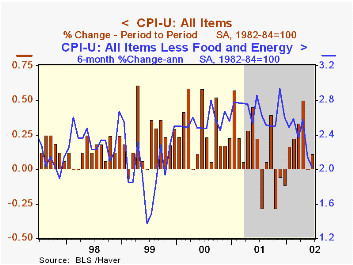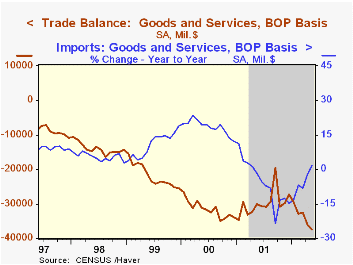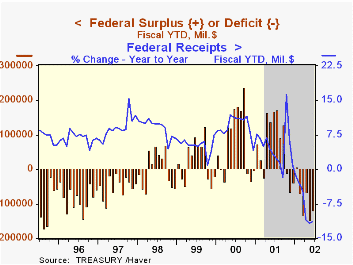 Global| Jul 19 2002
Global| Jul 19 2002CPI Rose Modestly
by:Tom Moeller
|in:Economy in Brief
Summary
Consumer prices rose less than expected last month. Consensus expectations were for a 0.2% rise. Less food & energy, prices also rose less than the expected 0.2%. Price gains across categories were notably weak, especially for [...]

Consumer prices rose less than expected last month. Consensus expectations were for a 0.2% rise. Less food & energy, prices also rose less than the expected 0.2%.
Price gains across categories were notably weak, especially for services. The 0.1% gain in core services was the second like gain this year and reflected a weak 0.1% (3.6% y/y) gain in shelter prices, a 0.2% (4.9% y/y) gain in medical care services and a decline in public transportation (-2.3% y/y).
Core goods prices were quite tame. Home furnishings and operation prices fell for the fourth month this year. New vehicle prices fell for the sixth consecutive month. Apparel prices fell for the fourth month this year.
Energy prices were unchanged reflecting slight gains for gasoline and fuel oil but lower prices for piped gas and electricity.
| Consumer Price Index | June | May | Y/Y | 2001 | 2000 | 1999 |
|---|---|---|---|---|---|---|
| Total | 0.1% | 0.0% | 1.1% | 2.8% | 3.4% | 2.2% |
| Total less Food & Energy | 0.1% | 0.2% | 2.3% | 2.7% | 2.4% | 2.1% |
| Goods less Food & Energy | -0.1% | -0.3% | -1.0% | 0.3% | 0.5% | 0.7% |
| Services less Energy | 0.1% | 0.3% | 3.7% | 3.7% | 3.3% | 2.7% |
| Energy | 0.0% | -0.7% | -11.3% | 3.7% | 16.9% | 3.6% |
| Food & Beverages | 0.1% | -0.2% | 1.6% | 3.1% | 2.3% | 2.1% |
by Tom Moeller July 19, 2002

The U.S. foreign trade deficit deepened more than expected in May to a new record. April's deficit was revised deeper.
So far in 2Q02 the monthly trade deficit has averaged $36.9B versus $31.6B in 1Q. Last year the trade deficit averaged $29.9B per month.
Exports rose less than expected reflecting a weak gain in capital goods (-13.6% y/y) and a decline in nonauto consumer goods (-12.4% y/y).
Imports rose sharply reflecting across the board strong gains.Imports of nonauto capital goods rose 0.7% (-3.2% y/y). Imports of nonauto consumer goods also were strong, up 2.3% (8.5% y/y). Automotive imports also surged and are up 13.2% y/y.
| Foreign Trade | May | April | Y/Y | 2001 | 2000 | 1999 |
|---|---|---|---|---|---|---|
| Trade Deficit | $37.6B | $36.1B | $30.1B(5/01) | $358.3B | $378.7B | $262.2B |
| Exports - Goods & Services | 0.7% | 2.1% | -6.3% | -6.2% | 11.2% | 2.6% |
| Imports - Goods & Services | 1.8% | 4.8% | 1.7% | -6.0% | 18.3% | 10.9% |
by Tom Moeller July 19, 2002

The June US budget deteriorated somewhat less than expected. A monthly surplus of $25.0B had been expected versus last year's June surplus of $31.9B. The June fiscal YTD deficit for 2002 was the largest since 1995.
Receipts rose sharply m/m due to a surge in individual tax payments. Individual tax payments fell 19.6% fiscal YTD as a result of higher unemployment. Fiscal YTD corporate tax receipts fell 15.9% versus last year.
Federal expenditures fell m/m but remained up 7.5% versus last fiscal year. Higher spending on defense (12.4% YTD), education (13.2% YTD) and income security (13.6% YTD).
| US Government Finance | June | May | Fiscal YTD | 2001 | 2000 | 1999 |
|---|---|---|---|---|---|---|
| Budget Balance | $29.1B | $-80.6B | $-118.0B | $127.2B | $236.9B | $124.4B |
| Revenues | $182.6B | $102.5B | -11.4% | -1.7% | 10.8% | 6.1% |
| Outlays | $153.6B | $183.1B | 7.5% | 4.2% | 5.0% | 3.1% |
Tom Moeller
AuthorMore in Author Profile »Prior to joining Haver Analytics in 2000, Mr. Moeller worked as the Economist at Chancellor Capital Management from 1985 to 1999. There, he developed comprehensive economic forecasts and interpreted economic data for equity and fixed income portfolio managers. Also at Chancellor, Mr. Moeller worked as an equity analyst and was responsible for researching and rating companies in the economically sensitive automobile and housing industries for investment in Chancellor’s equity portfolio. Prior to joining Chancellor, Mr. Moeller was an Economist at Citibank from 1979 to 1984. He also analyzed pricing behavior in the metals industry for the Council on Wage and Price Stability in Washington, D.C. In 1999, Mr. Moeller received the award for most accurate forecast from the Forecasters' Club of New York. From 1990 to 1992 he was President of the New York Association for Business Economists. Mr. Moeller earned an M.B.A. in Finance from Fordham University, where he graduated in 1987. He holds a Bachelor of Arts in Economics from George Washington University.
More Economy in Brief
 Global| Feb 05 2026
Global| Feb 05 2026Charts of the Week: Balanced Policy, Resilient Data and AI Narratives
by:Andrew Cates






